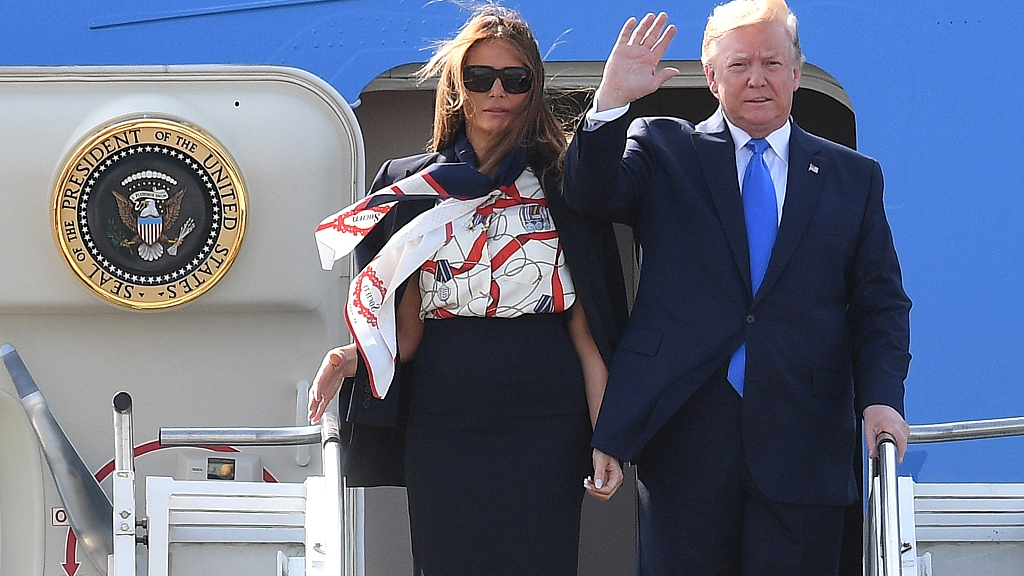
(Photo: CGTN)
Editor's Note: Tom Fowdy is a British political and international relations analyst and a graduate of Durham and Oxford universities. He writes on topics pertaining to China, the DPRK, Britain, and the United States.
Today sees US President Donald Trump visiting the United Kingdom on his first official state visit, meeting with departing Prime Minister May, as well as Queen Elizabeth. High on the agenda will be the issue of China and Huawei. In prior press conferences, the US issued an explicit threat to London that if Britain does not ban Huawei completely from its 5G networks, then it may have to cut intelligence sharing between the two countries, as well as weaken incentives for a potential trade agreement which Trump has touted.
The threats come amid a position of existing diplomatic discomfort with the UK as it strives to come to an arrangement to depart the European Union. With a number of right wing eurosceptics contending to replace May, it may be a path Downing Street opts for in the future.
However, to follow suit with the Trump administration on China will not help Britain's national interests, but will in fact serve to harm them. British conservatives once again are erroneous pertaining to the country's actual standing in the world.
With the contemporary UK long past the peak of its power, and sitting on a fragile economy in a tense situation with Europe, to jump into a path of confrontation with Beijing will serve to weaken London as a global economic center and deepen the country's diplomatic isolation. What Trump offers in return does not come close to outweighing the costs, with the president likely to demand one-sided, unilateral terms which place "America First," including the carving up of Britain's National Health Service.
Right wing politicians in the UK are driven by nostalgia than economic reason. Looking back to the imagery and glory of the British Empire, supporters of a hawkish foreign policy overstate the country's influence in the world and believe Britain still has the potential to operate as a great power, hand in hand with the United States. The reality is quite different, as the developing world expands and in the turmoil of Brexit, Britain's economy is actually becoming smaller and smaller as a relative size to the rest of the world. Once the "jewel" of the empire, India's economy is set to overtake the UK in the next year.
As economic power wavers, military power wavers too. The UK's global presence is long gone and the country's armed forces have actually been reduced in size due to the strain in costs. Why? That's because beyond all the nationalist rhetoric, pragmatic policymakers have recognized an enormous military is nor sustainable nor desirable in the long run. When Gavin Williamson spoke of a new age of "British hard power" it was a notion which bore no factual standing whatsoever bar its rhetorical appeal to Brexit voters.
Given this, such eurosceptic and pro-US politicians have failed to comprehend that Britain's best interests are served through the projection of multilateral institutions, than by a misleading belief that the country can "battle alone" alongside Washington. Such institutions most obviously include, the EU. Thus when the UK began a process to leave the subsequent bloc, it isolated itself from 27 of its closest economic, diplomatic and security partners. Britain's estrangement from the bloc has subsequently weakened its bid to project and channel its influence within the continent.
Siding with the US which conducts its foreign policy solely in unilateral, one-sided terms cannot fill that void. If the UK believes it can gain diplomatic favor from Washington by also shutting out Beijing, as to whom it also enjoys robust economic ties with, it is wrong. The UK would have much to lose on both counts.
With China also shut out of the picture, one should note that the current US administration offers not even its closest allies fair or equal terms. After Brexit is concluded, Trump would strive to impose, as a superpower, a one-sided trade agreement upon the smaller UK. The US ambassador to the UK has already confirmed this should include the notion of Britain's National Health Service, forcing the free healthcare state system to become privatized for profits.
As a result, to follow the Trump path would prove to be another critical mistake for British foreign policy. London would be isolated from Europe, isolated from China and not an independent power making its own way in the world as the arch-eurosceptics believe, but completely subservient to the economic exploitation of Washington, with little to show domestically for it. Britain's economic decline would ultimately serve to accelerate.
Thus, even in the midst of threats, the next prime minister should think wisely before it follows suit with Trump. There is always room for a positive relationship with the US, culture and history demands it. However, Britain's true strength today lies in keeping the doors open to the world, that includes China and of course, Huawei.


